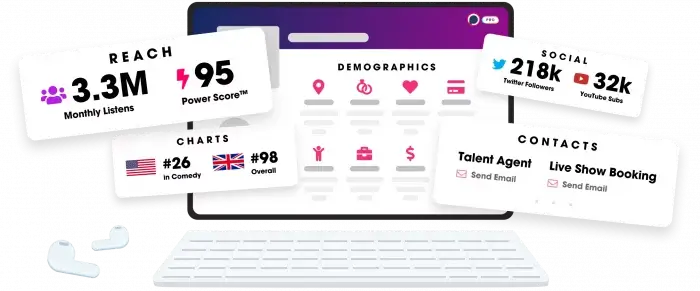How Podcasts Can Help with PR Crisis Management
Sometimes when working in PR, the worst case scenario happens. Your client does or says something with huge negative consequences – and it’s up to you to fix it. Because if you don’t steer your client’s reputation back on the right path, it could be the end of their organization.
I do not envy your situation, but luckily there are proven strategies for PR crisis management that you can follow to get your client out of the weeds. In this article, we’ll discuss the traditional methods of PR crisis management, and how podcasts are a powerful tool when your back is against the wall.
Table of Contents:
- Traditional Methods of PR Crisis Management
- Why You Should Use Podcasts for PR Crisis Management
- How to Find Podcasts to Manage Your Crisis with Podchaser Pro
Traditional Methods of PR Crisis Management

There are no tricks to magically get your client out of hot water. When your client is under the microscope of public opinion, there’s only one thing to do. Come clean.
Make a Plan
Long before a crisis occurs, you should make a plan. You don’t know exactly what the crisis will be, but you can set procedures that allow you to act quickly when a problem does occur. With your team, plan where your message will be shared, the tone you’d like to use, and who you will nominate to speak on behalf of the company.
Take Responsibility
In your apology message, you have to admit that you made mistakes. Never be defensive and list excuses for why everyone else is to blame. Doing so only digs yourself into a bigger hole and can heavily reduce consumer faith in your client’s company.
Take Action
Don’t just apologize, but make actual changes to ensure that the crisis never happens again. Share your action plan with your audience and what you’ve already done to address the situation. It’s this follow-through that ideally restores public faith in your client.
Why You Should Use Podcasts for PR Crisis Management

You want to make sure that your whole audience sees your apology, so crisis management messages are usually shared on multiple channels – mainly social media and press releases.
Podcasts are underutilized by PR firms in a crisis, but the unique power of the medium is perfect to regain your client’s reputation.
In this next section we’ll dive deeper into three reasons why podcast are uniquely suited for PR crisis management
- Podcasts are Authentic
- Podcasts are Longform
- Podcast Listeners Trust Their Favorite Hosts
Podcasts are Authentic
Many mediums that are used for PR can feel a little contrived, put-on, or insincere. When have you ever read a tweet from a company and felt confident that they really meant what they said? No matter how good your apology is, most mediums can feel impersonal.
This is where podcasting really shines. Not only can audiences read your message, but hear a real human’s voice saying it. Research has shown that the way you speak drastically alters if the listener trusts you. So having your representative guest on a podcast or recording an episode of your branded podcast, can make or break how well your message is received.
If audiences can hear the authenticity of your apology, it can go a long way to restoring faith in your client’s company.
Podcasts Are Longform
Part of what makes certain corporate apologies seem so insincere is their brevity. If the crisis is complex, how can you expect to win audiences back with a 280-character tweet? Or a three paragraph press release?
You need to show your audience that you’re taking the problem seriously by spending time digging into the discussion.
The average podcast episode is 41 minutes, giving you enough time to take responsibility for the crisis, show how you’re taking action, and respond to any concerns from your audience.
Podcast Listeners Trust Their Favorite Hosts
This doesn’t apply to those delivering your message via a branded podcast, only to those who are guesting on other podcasts.
A study from Acast found that podcast listeners have twice as much trust in a podcast host talking about a brand or company than they do in radio. Listeners have grown emotionally close to their favorite hosts and deeply respect what they have to say.
That trust transfers to the podcast guest as well, because if the host lets your client on their show, they are implicitly endorsing them. This means that podcast listeners are more likely to be responsive to your message and to accept your apology.
How to Find Podcasts to Manage your Crisis with Podchaser Pro

As we said earlier, the first step of crisis management is planning ahead. If a crisis occurs and only then you start searching for podcasts to guest on, you’re going to be too late. At best it can take weeks to get booked as a podcast guest, which is far too slow in a crisis.
So as part of your crisis plan you need to find the perfect podcasts to guest on as well as contact the host and convince them to have your client on their show. If you’ve never done this before, it can seem daunting. There are 4.5 million podcasts…which ones are the perfect fit for your client’s company? And once you find a show you’d like to reach out to, how do you find their contact information?
Podchaser Pro is here to help. Podchaser is the world’s most comprehensive podcast database, and Podchaser Pro unlocks access to truly one-of-a-kind podcast data. With Podchaser Pro, you’re just a few clicks away from knowing almost every podcast’s contact information, sponsor history, reach, Power Score™(cross-platform popularity), demographics, and more.
And crisis management is only the tip of the iceberg for PR professionals looking to use Podchaser Pro. Check out our full article about all the ways PR can benefit from Podchaser Pro.
If you’re already invested and want to learn more, request a free demo to see why Forbes called Podchaser Pro, “an incredibly useful tool for podcast marketing or booking guests or promoting to media or for research and development.”
Unlock more with Podchaser Pro
- Audience Insights
- Contact Information
- Demographics
- Charts
- Sponsor History
- and More!

- Account
- Register
- Log In
- Find Friends
- Resources
- Help Center
- Blog
- API
Podchaser is the ultimate destination for podcast data, search, and discovery. Learn More
- © 2024 Podchaser, Inc.
- Privacy Policy
- Terms of Service
- Contact Us